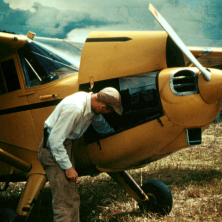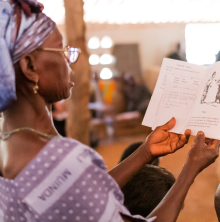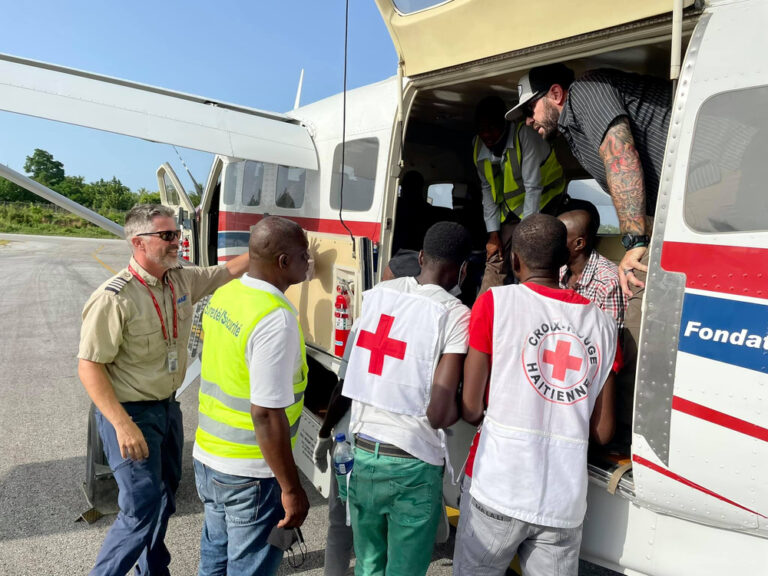With MAF’s help, an American fighter works to free an enslaved people
After carrying a 120-pound bag of charcoal attached to a strap wrapped around her forehead through the jungle for three miles, the woman held out her hand to receive her wages, her food for the day—a small square of goat fur. One man worked a grueling 10-plus hours in exchange for two small minnows.
For the Mbuti Pygmies living deep in the Ituri rain forest of eastern Democratic Republic of the Congo (DRC), these are real examples of how they’re being exploited by their “masters,” the Mokpala (non-Pygmy Congolese). Forced into slavery, the Pygmies farm the very land that rightfully belongs to them. They are often treated as second-class citizens, and many in the DRC believe the Pygmies are half animal.
They call themselves the “Forgotten People.” But they’re not forgotten. God is making sure of that.
A Champion for the Pygmy People

In the USA, mixed martial artist (MMA) Justin Wren wanted nothing more than to become an Ultimate Fighting Championship (UFC) fighter. He won several Texas state championships, was a two-time national champion, and competed in season 10 of The Ultimate Fighter. But his success in the ring only masked his depression and addiction.
He hit rock bottom right around the same time a friend invited him to attend a Christian men’s retreat in 2010. Uncharacteristically, he accepted. It was there that he met Christ … and his life was forever changed.
Wren went on a short-term mission trip where he encountered the Pygmies and realized they had no one to help them. He developed a vision to buy their land back and dig wells in their villages—and ultimately to set them free.
It was a grand scheme, one that Wren couldn’t accomplish alone. Fortunately, God brought him together with members of Shalom University of Bunia. Working together, Wren and Shalom have acquired over 2,400 acres of land in 10 different Pygmy villages and successfully completed 14 wells. The Pygmies are learning how to grow their own food on their own land—plantains, corn, and beans. They’re also transplanting trees to bring new growth to the forest, and a coffee project has recently been started. Being responsible for their own land and food production means they are no longer under the oppression of the Mokpala.
But the work has not been without setbacks.
In November 2013, Wren contracted a bad case of malaria. After six days of fever, vomiting, and not eating, he had lost 30 pounds and was near death.
MAF was called to perform an emergency medevac, and on Thanksgiving Day flew Wren to Entebbe, Uganda, to a waiting ambulance. Doctors discovered he had typhoid fever and malaria; 70 percent of his bloodstream contained parasites. Had he waited another day, or even hours, he could have been in a coma … or worse.
“They said I had blackwater fever, the end stages of malaria. I don’t know of an airline, or any pilot, who would just drop everything on Thanksgiving Day … I owe you guys a lot.”
After recuperating, Wren returned to the DRC to continue the work, and found himself in need of MAF once again. While transporting the final pieces of a well through the jungle in 4×4 vehicles, Wren and his fellow workers encountered a washed-out bridge. The bridge was the only way to reach the Pygmy village.
“We couldn’t get the final pieces to our well drillers that were completing a well,” said Wren. “And if they wouldn’t have finished it, the hole could have started collapsing.” Two weeks’ worth of labor would have been lost.
Redoing the well would have meant paying the well drillers’ wages again and feeding them for an additional two weeks. But fortunately, MAF was able to help.
“MAF pilots flew us over the broken bridge and into the jungle!” said Wren.
The Path to Victory
Wren returned to the U.S. in November 2014 but plans to continue fighting for the Pygmies—both from the States and in the DRC. (He visited the DRC again this past May.) Shalom staff and students continue to monitor the work in the villages and have been handling the day-to-day logistics. They’re also trying to mobilize local churches to conduct Bible studies in the forest areas. While all of the above are positive steps, the road to freedom for the Pygmies will not be an easy one.
Raising and selling their own crops means they’re free to blow their earnings on things like hemp and alcohol, by which the Pygmies are also enslaved. For them to truly be free, they need to know the Lord Jesus Christ. Then they will be free indeed.
And MAF will be in Wren and Shalom’s corner every step of the way, ready to support them in this fight.



